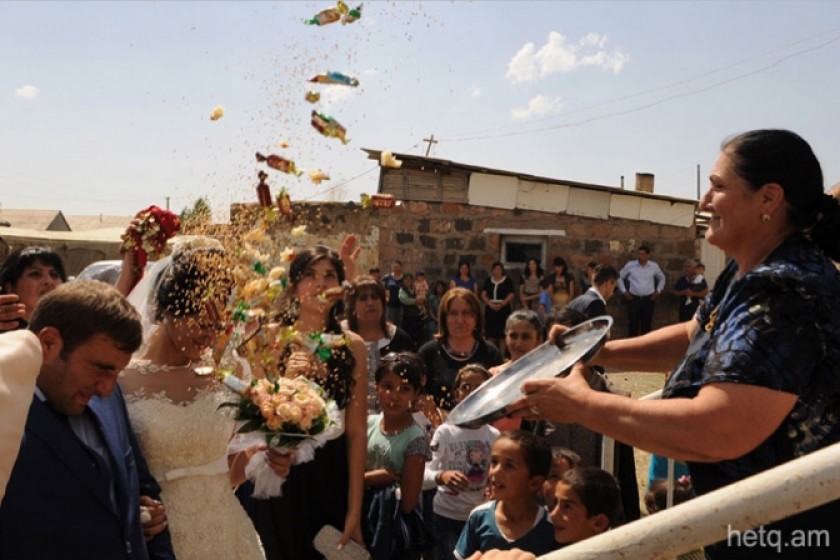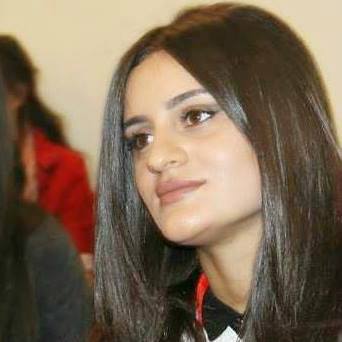
Demolishing Stereotypes: Young Yezidi Women in Armenia are Trying to Effect Change
By Marineh Sahakyan
“It’s Zozan. As always, she’s nicely dressed. Like the others, she now longer wears a headscarf.”
This is the comment made by one of the residents of Zozan’s village – Kanakeravan, in Armenia’s Kotayk Province. The villager adds that Zozan always sends her kids to school properly dressed.
In the Yezidi language, Zozan means “great places of relaxation, the mountains.”
Zozan, 37 years-old, married at the age of twenty, according to Yezidi tradition. The only bow to modernity was that her husband wore a white suit at the wedding.
“Back in the day, the godfather would place the ring on the bride’s finger. Now, it’s changed a bit. They bring the bride to a beautiful hall, and the groom places the ring. In addition to gold, he presents a telephone as a gift, so that they’ll always keep in touch,” says Zozan.
Today, the young folk of the village can go out together after getting engaged. It was different seventeen years ago when Zozan married.
“Yes, we’re from the same village. But he wouldn’t visit. His mother used to bring me gifts. We kept in touch from afar. He’s the son of my uncle,” says Zozan.
The Yezidis recognize three castes – the sheikhs, the pirs (elders) and the murids (disciples). The first two are religious castes; the third is secular. Marriage among different castes in prohibited.
“We’re from the pir caste. People don’t know that we are few, that we can’t marry others. I will not violate these rules, the religion. But I cut and dye hair, pluck eyebrows, and use cosmetics. It’s sacrilege for me,” Zozan says.
She has three children – girls aged 17 and 15, and a 13-year-old son. When Zozan sent them to kindergarten, other Yezidi villagers criticized her. It just wasn’t done.
Zozan’s parents took her out of school before she finished fifth grade. She says her children will finish school. This too has been met with disdain.
“They talk behind my back. They say I don’t give my girls chores to do at home, and instead, I keep them in school. But I want them to attend classes regularly,” says the mother. Her children would like to further their education after high school.
All three of Zozan’s children attend music classes. Her son plays the kamancha and piano at village events.
“My eldest daughter has sketched 200 clothing designs. She just might become a designer,” says Zozan, who frowns on girls getting married at the age of fourteen or fifteen.
“I recently attended a wedding where the bride was fifteen. Such affairs must be prohibited. They disrupt the child’s life. They have to marry later to correctly build a family.”
Zozan is also disparaged for sending her children to various hobby groups. Relatives tell her the money should be spent on renovating the house and buying livestock.
Zozan has been working in Yerevan for the past year, in a plant that makes meat pies. This too has been frowned upon by relatives who tell her to stay at home and tend to the livestock. Zozan stopped such chores five years ago and plans to keep it that way.
“My husband has worked in construction for twelve years. We want to work in better conditions and as registered employees. If one can juggle raising livestock and a job, that’s fine, let them. Today, though, one can no longer live like that. I want to learn how to sew. I have unfinished objectives.”
Zozan regrets not having pursued her education. She boasts that her coworkers are amazed by her mathematical skills.
Leyla, a 22-year-old Yezidi mother of two who resides in Yerevan, says she never had the chance to attend university. She wants to learn accounting.
“The concept that Yezidis shouldn’t attend school has long since disappeared, or is on the way out,” Leyla says.
 Khaneh Mahmoudyan (photo) graduated this year with a Masters in Oriental Studies from Yerevan State University.
Khaneh Mahmoudyan (photo) graduated this year with a Masters in Oriental Studies from Yerevan State University.
She says that her grandfathers have always encouraged attending school and getting an education. Her uncle and aunt have university degrees.
“It’s wrong to believe that all Yezidis don’t attend school,” says Mahmoudyan, adding that the number of rural Yezidi woman attending university increases yearly.
The woman I talk to in the village say that Armenians have incorrect views about Yezidis, calling some of their rituals as absurd, without understanding their meaning.
“For some Armenians, saying the word Yezidi connotates marrying your relative, not going to school, and marrying at a young age. I must note that while such things exist, one cannot look at the entire Yezidi nation in such a way,” says Mahmoudyan.
She says that Yezidi marriage rituals are wonderous and have deep significance.
“Recently, I came across a discussion on some social website alleging that at a Yezidi wedding they beat the bride’s head with brooms. I can assure you, this doesn’t happen,” says Leyla.
Khaneh and Leyla talked about marriages between relatives, confessing that they have encountered such instances, but criticize them.
“I and young people like me declare that our children will not marry their cousins,” Leyla says.
They tell me that young Yezidi families also celebrate Armenian holidays – Vardavar, Easter and New Year’s. Zozan says that for the first six years of married life, when she lived with her mother-in-law, they didn’t celebrate Armenia holidays. After moving out, however, she bought and decorated a Christmas tree and prepared gifts for the children and loved ones.
“Now, all the young wives prepare an Armenian holiday table. Pork, of course, isn’t allowed,” says Zozan, adding that one of the reasons is that swine do not chew their cud.
The young Yezidi women say they have never encountered discrimination in Armenia and have Armenian friends.
While Leyla believes that males are the final arbiters, she says that in today’s Yezidi households the decision results from a joint discussion between husband and wife. One of the major virtues of a Yezidi women, Leyla believes, is to pass down the Yezidi language, songs and history to the children, and to maintain respect for their elders.
“You can say I’m a preserver of national culture. I sing Yezidi songs to my kids, and speak to them in our language.”
Khaneh wants to see the Yezidi women of today and tomorrow to be self-confidant. “My greatest wish is that Yezidi women are cultured and raised with national values,” she says.
Zozan says that Yezidi women work much more than their husbands and often earn more.
“Sure, the man can come and go. But the woman is the pillar of the home. No one mentions this. It’s as if it’s still not acceptable for a woman to speak out and express a point of view. My husband takes what I have to say into consideration, but not my father,” she says.
Zozan would like to see the day when a Yezidi woman can stand as an equal beside her husband, and for society as a whole to accept it as fact.
 Videos
Videos Photos
Photos
Write a comment